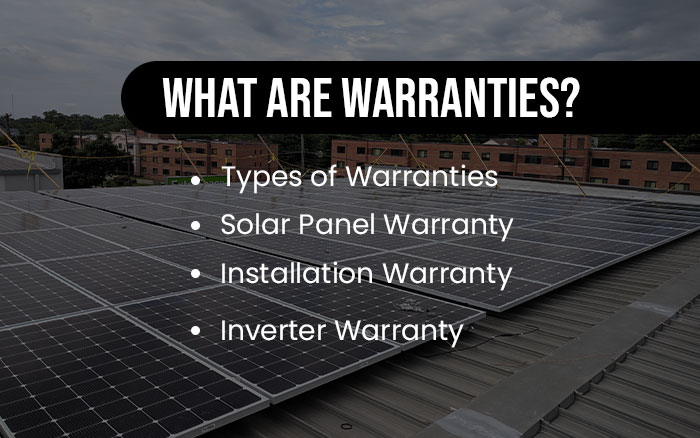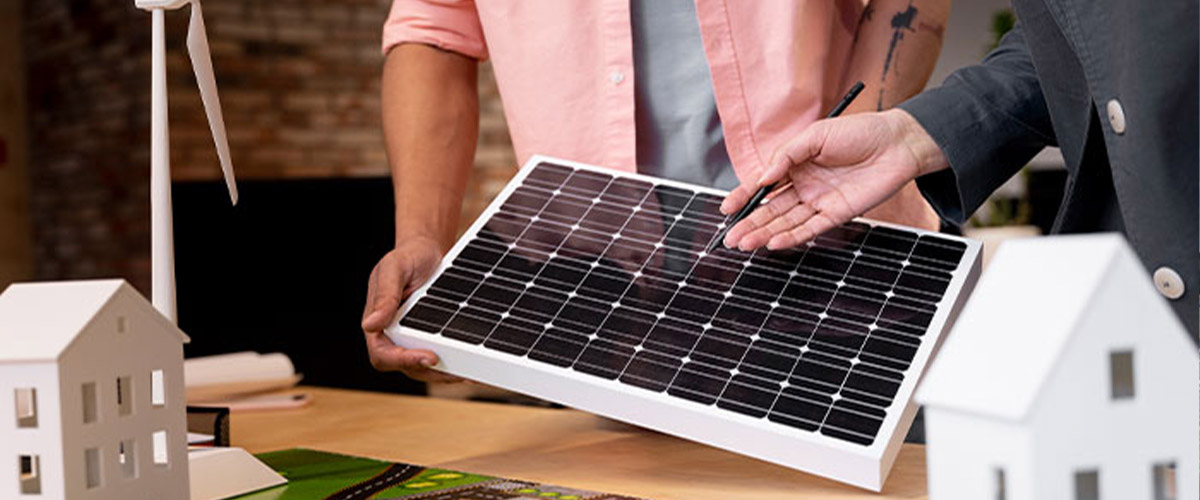Things to consider before to installing solar panels>
If you're a homeowner, you've already considered the advantages of solar energy. Since it is a costly purchase that you'll need to live with for the next 25 years, It is essential to conduct a thorough study before making a decision. Let's look at few essential factors to consider when installing solar. We are confident that these answers will simplify your solar journey.
Do you have confidence in your contractor?
Installing a solar energy system is also a home improvement and electrical project. This is why, when you seek the best contractor, you verify that they have the right qualifications. For instance, checking if they have certification from the North American Board of Certified Energy Practitioners (NABCEP) is an excellent place to begin.
If you plan to do something as expensive and complicated as putting solar panels on your house, you must work with an expert. Conducting research on the companies in your area by reading reviews and reviewing their previous work is essential for achieving good results. Even if that means spending just a bit more than you anticipated but it's worth it. Quality should be the top priority above all else because solar panels will serve you for years to come, so it's best to better invest in a reputable service! Stay away from the first item that pops up in your Google search, and do some research before you make a decision! Keep browsing to find the best solar companies in Delaware.
Your home would benefit greatly from solar panels. They provide a variety of benefits and will save you money over the long haul, and help save the environment little by little. If you're considering purchasing them, they are an incredible investment for your home!
Did you select the least expensive alternatives?
The pricier solar panels sometimes translate into superior solar panels. While technology has improved substantially in the past decade, putting your money on the lowest-cost models or brands of solar panels could result in a dark. The cheapest or lower-end solar panels are usually made in a manner that renders them less durable. If solar panels fail to last, it reduces the value of your investment, as with the potential savings you can make in the future. The worst part is that less durable panels can harm your safety. The most important thing you want to avoid is for a fire to occur in your home due to the use of poor-quality solar panels.
As an individual, it is crucial to put the time and money into installing the correct solar panels. In the long run, it will last longer and yield a higher return.
What are warranties?

Warranties are an essential element in safeguarding your solar panels and related equipment. A warranty can help you hold the manufacturer accountable without expense if something occurs to your solar panels. Incentives (available in a variety of states) may require you to have a solar panel warranty.
The programs will only consider your request if you have a guarantee.
- Types of Warranties
There are a variety of warranties available for solar panels and equipment, as well as installation. Certain warranties include:
- Solar Panel Warranty
This kind of warranty will be valid for 25-30 years. If the warranty provided to you is less than 25 years, you should know that it is considered less than the industry norm. The warranty guarantees a minimum power output during the duration of the warranty. The industry standards suggest that you should get an average of 80 percent energy output over the period the warranty covers the panels.
- Installation Warranty
This warranty covers cases where solar panels and related equipment have been installed in a way that needs to be corrected. These types of warranties typically last between 2 and 10 years. They typically include things such as the parts and labour required to repair or replace components of the system roof penetrations, shipping replacement of defective parts, and much more. For more information, be sure to inquire with your contractor about the warranties they offer for their installation.
- Inverter Warranty
The type of warranty could vary from one company to another.
Some industry standards can assist you in understanding the warranty you are entitled to. The standard "string inverters" that handle the power of the "string" of panels typically come with a warranty of 5-10 years. Generic "micro-inverters" that attach to the individual panels carry warranties that range from 20-25 years. Inverter warranties generally cover manufacturing defects or material and imperfections. Inverter warranties usually do not cover improper installation or normal wear and wear due to extreme weather conditions and inadequate maintenance.
Are you insured? Do you have the proper insurance?
Consider the right insurance policy to protect yourself and your home if damage occurs during installation. When you install solar panels, many problems can arise, and you only consider them afterward. Moreover, before work begins, many building codes, rebate requirements, legal regulations and certificates must be met. Before you begin your project, you should find out what the state's rules and regulations are.
Did you make use of discounts?
Installing solar panels in your home could cost between $10,000 to $30,000. Some good news: many cities, states, and solar companies in the Delaware offer rebates for installing solar panels on your roof. Before starting your project, discuss with your contractor the options they have. If they don't have a choice, they should be aware of rebates offered by the state or cities.
Overall, the government wants to encourage people to be interested in investing in solar energy. The Department of Energy offers up to 30% savings via tax credits and rebates. Your local electricity and utility service providers could have savings too.
Read More: Benefits of solar Pannels
Do you have to DIY?
Solar panel installation should be left to the pros, period. Many things could be wrong if you're not correctly educated in the installation process. Examples include:
Wiring problems It is an occupation that requires you to deal with electrical components. If they are not set up correctly, you can create electrical shocks that can harm the person working around you and others. Electrical work should always be performed by an electrician.
Leaky Roof: Solar panels require you to make holes in your roof. If these holes aren't constructed or sealed correctly, you could damage your roof and cause leaks.
Safety Standards and Code Compliance: Most solar panel warranties call for installation by an authorized professional. If you install the equipment yourself, the warranties are null and void. Damage caused during installation or a defect with the methods used to make and install the panels won't be covered.
Additionally, permits for building and other applicable rules and regulations can be hard to adhere to if unfamiliar with these rules and regulations. All paperwork must be done correctly, or the project may be denied.
In conclusion
The decision to install solar panels requires careful consideration and a proactive approach. By thoroughly evaluating your options, selecting a reputable contractor, understanding warranties, securing insurance, exploring discounts, and avoiding the DIY route, you're setting the stage for a successful and sustainable solar journey. View companies like Arise Solar Services to get more tips. Solar panels not only enhance the value of your property but also contribute to a cleaner and more sustainable future. Take the time to make informed decisions, and reap the rewards of a well-executed solar panel installation.
